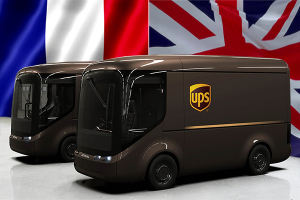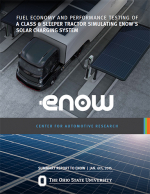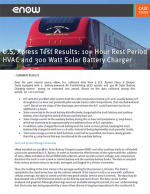Reducing Fleet Operation Costs Using Solar Powered Idle Reduction Technology
This paper details how eNow’s solar-powered idle reduction systems are designed to meet a wide range of auxiliary energy needs for medium and heavy-duty trucks and buses.
Background
Heavy-duty vehicles are less than 5% of registered vehicles on the road in the US, but they account for approximately 25% of fuel use and 20% of greenhouse gas emissions coming from the transportation sector due to their significantly higher use rate compared to other vehicle types.
In addition to over-the-road fuel use, trucks use a considerable amount of fuel to power auxiliary loads by idling the engine while at rest.
The primary reasons truck drivers idle is to heat and cool the cab and sleeper compartment, protect the engine in cold weather and operate onboard electrical appliances (i.e., “hotel loads” like computer, television, radio, phone, global positioning system, microwave, mini-refrigerators, and coffee makers).
The US EPA estimates that idling a heavy duty truck’s engine consumes about 1 gallon of diesel fuel per hour.
Therefore, a typical long-haul truck without idle reduction technology that idles 8 hours a day for 300 days per year can be expected to use 2,400 gallons of diesel fuel for idling each year, which is over 10% of the truck’s total fuel use.
This idling results in fuel costs of $9,600/year or $800/month when diesel fuel is $4/gallon.
Highlights
- High fuel costs, stringent anti-idling regulations, and state and federal emissions reductions targets are boosting demand for idle reduction technologies. A typical long-haul truck can use 2,400 gallons of fuel per year idling its engine to run auxiliary equipment. Fuel used for this idling costs $9,600 per truck per year assuming $4/gal diesel. This avoidable idling fuel cost erodes a trucker’s bottom line.
- Conventional idle reduction systems include diesel, battery, and grid-powered technologies. Performance of these idle reduction systems varies greatly in terms of fuel and other operating and maintenance (O&M) costs, emissions, and performance.
- eNow’s solar-powered eCharge System for In-Cab HVAC offers the lowest O&M costs, zero emissions, and superior performance compared with conventional idle reduction systems.
- The operating costs of producing a kilowatt-hour (kWh) of electricity using eNow’s solar powered system is $0, compared with between $2-3 for truck stop electrification and a diesel auxiliary power unit (APU), and $0.75 for a battery-only APU due to fuel costs associated with over-the-road battery charging.
- Solar powered APU systems provide additional savings of $400 to $3,400 per year compared with conventional battery-only APU systems.
What’s Related




Favorites





